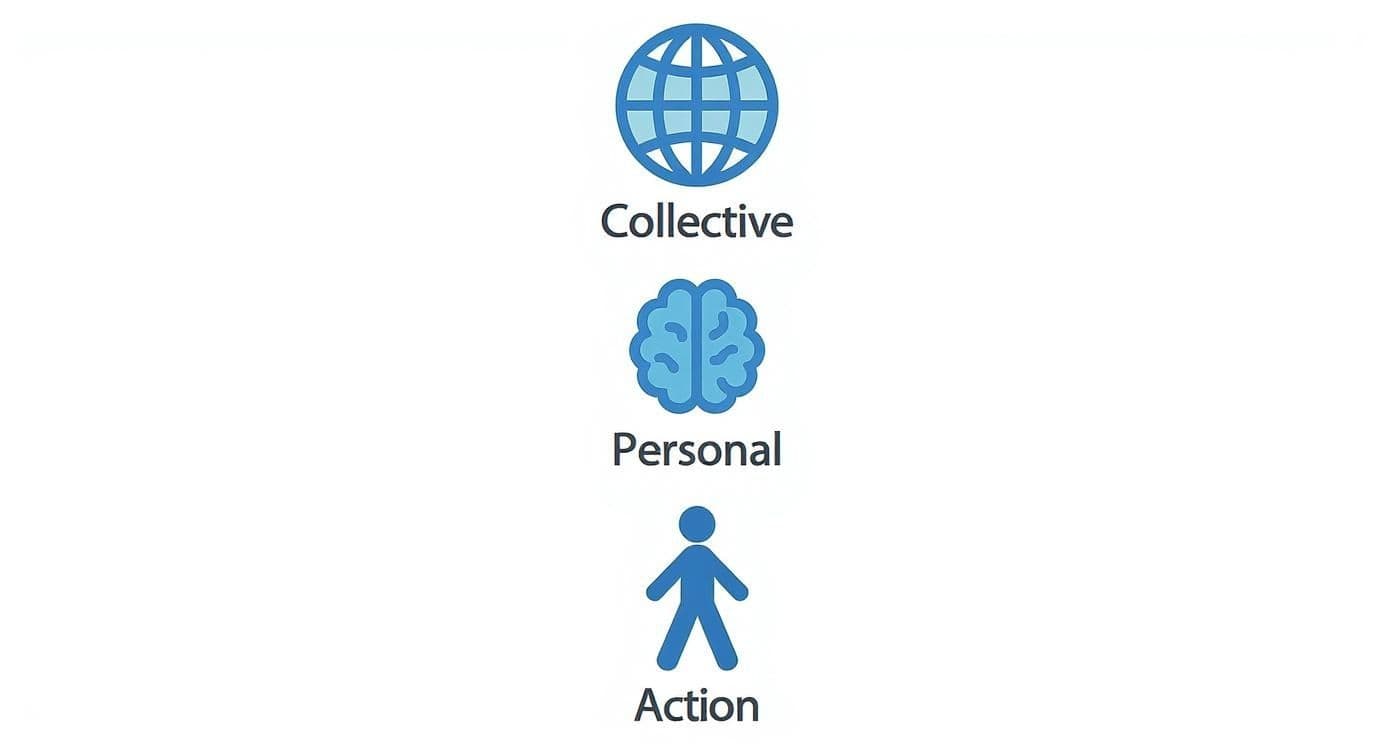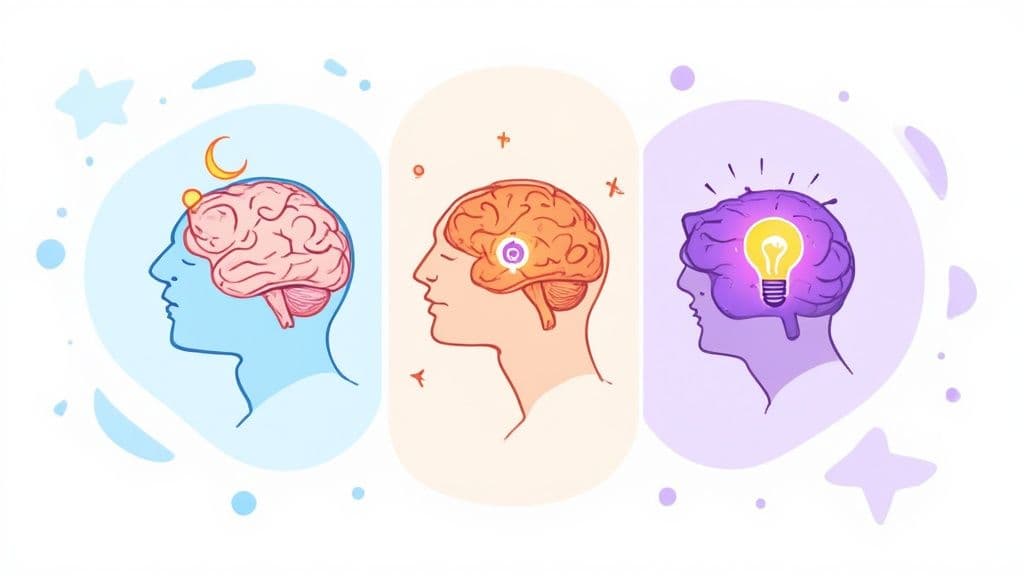Discover your current stage of consciousness and how it shapes your personal growth. Use this practical guide to navigate your unique journey of self-awareness.
November 25, 2025 (Today)
What Is Your Stage of Consciousness?
Discover your current stage of consciousness and how it shapes your personal growth. Use this practical guide to navigate your unique journey of self-awareness.
← Back to blog
What Is Your Stage of Consciousness?
Summary: Identify your current stage of consciousness and practical steps to grow your self-awareness, backed by science and daily practices.
Introduction
Have you ever felt like you were seeing the world through a completely new pair of glasses? Suddenly, things you once accepted without a second thought are up for debate. That subtle shift often means you’re moving into a new stage of consciousness.
This isn’t some mystical idea for a select few. Think of it as a practical roadmap for human development that shows how our perspectives, values, and awareness can expand over a lifetime. In this guide you’ll find clear stages, science-backed context, and simple daily practices to help you recognize where you are and where you might grow next.
Your Starting Point on the Path of Awareness
Imagine your stage of consciousness like leveling up in a game. With each level, your perspective widens, revealing more of the map and giving you new tools for navigating life. It’s the background operating system that shapes what you believe, what motivates you, and how you relate to others.
Most shifts aren’t single, dramatic awakenings. They’re gradual changes that add up until you look back and realize you’re a different person. Understanding this process can bring clarity to your struggles and point you toward practical next steps.
Embracing Your Unique Journey
The goal isn’t to judge your stage or rush to the next one. It’s to honor the unfolding of your own growth. The mainstream interest in inner work reflects a broader cultural shift toward prioritizing mental and emotional well-being, with the wellness economy growing rapidly in recent years1.
This trend isn’t only about individual self-care, it also reflects a collective yearning for deeper mindfulness, connection, and self-awareness.
“The hero’s journey is not about winning or losing. It’s about consciousness. Willingly embracing the unknown to evolve and grow in consciousness around a theme or aspect of life.”
A practical first step is turning attention inward. Learning how to become more self-aware is fundamental to recognizing your patterns and the lens through which you see the world. For a practical primer, see this guide on how to become more self-aware: https://enneagramuniverse.com/blog/how-to-become-more-self-aware.
If you want a structured next step, the guide on meditation for self-discovery can help deepen your practice: https://lifepurposeapp.com/blog/meditation-for-self-discovery.
Mapping the Journey of Human Consciousness
For centuries, mystics, thinkers, and psychologists have tried to map human experience. Though they use different names, their maps trace a similar course: a movement from a self-focused view toward a wider, more connected perspective.
This evolution isn’t a race or a test, it’s a natural unfolding. Seeing these stages can give you a powerful lens for understanding your motivations and spotting your next growth edge.

A Simplified Model of Consciousness Stages
You’ll likely recognize these patterns in yourself and others. Pinpointing where you are can illuminate your core motivations.
-
The Survival Stage: Energy is focused on safety, security, and meeting immediate needs. Decisions are practical and grounded in the here and now. This is the foundation.
-
The Conformity Stage: Belonging matters most. Identity forms through adopting the values and rules of family, culture, or community.
-
The Achiever Stage: Ambition and personal success drive choices. The focus is on achievement, competence, and leaving a mark on the world.
-
The Integrated Stage: Perspective widens to include connection and contribution. The focus shifts from “me” to “we,” and purpose centers on service and meaning.
These stages aren’t a rigid ladder. Life can move us back and forth as circumstances change. For another perspective on spiritual development stages, see this overview: https://lifepurposeapp.com/blog/spiritual-development-stages.
This journey from a self-centered to a world-centered viewpoint is the essence of expanding consciousness.
Common Stages at a Glance
| Stage Name | Core Focus & Motivation | Example Mindset |
|---|---|---|
| Survival | Safety and basic needs | “I need to make sure my family has a roof over their heads.” |
| Conformity | Belonging and acceptance | “What will people think? I want to do the right thing.” |
| Achiever | Success and personal goals | “I’m going to build my business and be the best in my field.” |
| Integrated | Contribution and purpose | “How can my work help create a better, more sustainable world?” |
These patterns can help you have compassion for yourself and others, wherever you are on the path.
Dan Millman’s book, The Life You Were Born to Live, maps specific life paths that can add a personalized layer of meaning to your current stage4. Using the Life Purpose App, you can discover your life number and see how your core themes are showing up now: https://lifepurposeapp.com.
How Your Brain Handles Shifting Awareness
Although the journey of consciousness often feels personal and mysterious, neuroscience offers useful insight. Shifts in awareness aren’t just psychological, they’re accompanied by measurable brain changes.

Think about your brain on autopilot during a commute versus in a creative breakthrough. Those are distinct states of neural activity. As we learn and evolve, our neural patterns change to support more complex perspectives.
The Science of Seeing Differently
Neuroscience explores this through research on the Neural Correlates of Consciousness, which seeks to map specific brain activity to subjective experience2. Learning new skills and shifting perspectives are both supported by neuroplasticity, the brain’s capacity to rewire itself over time3.
This biological change shows that personal growth isn’t only an idea, it’s a physical transformation—your brain reshapes itself as your awareness expands.
Brain Regions and Conscious Experience
Conscious experience involves many brain regions, from the frontal lobes to deeper structures. Research has even identified neurons that fire when we consciously perceive something, helping distinguish conscious from unconscious processing2.
This research shows a synergy between spiritual growth and biology, each supporting the other.
Recognizing the Signs of a Consciousness Shift
How do you know you’re moving into a new stage? It’s usually a series of subtle shifts rather than a single “aha.” Learning to spot these signals helps you navigate change with clarity.
Your Inner Compass is Recalibrating
Common signs include:
- Shifting priorities: Goals that once felt essential may lose their appeal, while connection and purpose become more important.
- Questioning old beliefs: Long-held assumptions about success or relationships may begin to feel hollow.
- A need for more meaning: A persistent sense that there must be more to life than routine.
This process often resembles the hero’s journey, where you’re called to step into unknown territory and evolve.
New Perceptions and Sensitivities
Your experience of the world can change. You might feel a stronger connection to nature, or you may find crowded spaces and superficial conversations more draining. Intuition can become a clearer guide.
This path can feel lonely if your circle hasn’t shifted, and you may outgrow some relationships as you seek people who resonate with your emerging self.
Using Your Awareness for Deeper Personal Growth
Knowing your stage of consciousness is like getting a reliable GPS for inner work. It helps explain recurring challenges and reveals specific lessons you’re being invited to learn now.
Connecting Your Stage to Your Life Path
Dan Millman’s system offers one way to map your unique life themes and see how they’re expressed across different stages. Discovering your life number can make your current struggles and gifts feel more intelligible and actionable4.
Your life path is the unique flavor of your journey. Your stage of consciousness is the landscape you’re traveling through. Knowing both clarifies what you’re here to learn and how you’re currently equipped to learn it.
How a Life Theme Appears Across Stages
A creative life theme, for example, looks different depending on stage:
- Conformity Stage: Creativity is used to fit in or earn approval.
- Achiever Stage: Creativity aims for recognition and success.
- Integrated Stage: Creativity serves the greater good and fosters community healing.
Recognizing both your path and your stage helps you work with current challenges instead of feeling blocked by them.
Practical Ways to Nurture Your Growth
You don’t need a decade-long retreat to raise your stage. Small, consistent practices woven into daily life create real change.
![]()
Simple Practices for Daily Awareness
Pick one to start and build from there:
- Mindful Breathing: Pause several times a day for three slow, conscious breaths to calm your nervous system and return to the present.
- Nature Connection: Spend at least five minutes outside daily, noticing small details to feel grounded and part of something larger.
- Journaling Prompts: Each night, jot down one thing you questioned or one idea you saw from a new angle, to track and integrate shifts.
To support consistent change, you might explore actionable self-discipline techniques or deepen practice with meditation for self-discovery: https://lifepurposeapp.com/blog/meditation-for-self-discovery.
Answering Common Questions
Can I go backward in my stage of consciousness?
Not really. You might temporarily revert to older habits under stress, but once you’ve experienced a wider perspective, parts of that view remain. Slips happen, they don’t erase what you’ve learned.
Is one stage better than another?
No. Each stage offers necessary lessons and perspectives. The work is learning what your current stage offers and using it fully, rather than rushing to a “higher” level.
How does my Life Path number relate to my stage?
Your life number describes your core theme, and your stage frames how that theme is expressed right now. Knowing both gives you a clearer map of what you’re learning and how to work with it.
Quick Q&A — Practical Takeaways
Q: What’s the fastest way to notice a stage shift?
A: Track recurring changes in your priorities, values, and what drains or energizes you. Small daily reflections and journaling make shifts obvious over time.
Q: What daily habit helps the most?
A: Mindful breathing, done several times a day, is simple and effective for calming the nervous system and increasing present-moment awareness.
Q: How do I align my life path with my current stage?
A: Identify your core life theme, then ask how that theme could be expressed with more service, connection, or creativity depending on your stage. Tools like the Life Purpose App can help clarify your path.
Discover Your Life Purpose Today!
Unlock your true potential and find your life’s purpose.
